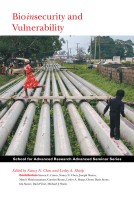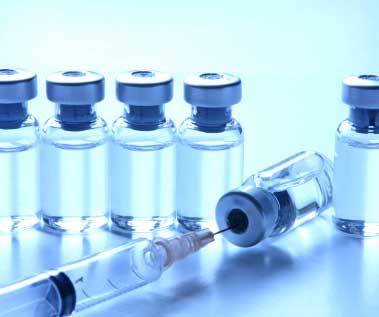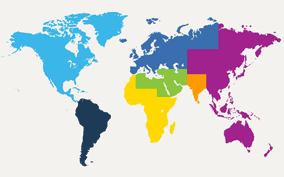-
Op-Ed – Dual-Use Research: Is it possible to protect the public without encroaching rights?

T. Tosin Fadeyi, Master’s Candidate, Biotechnology (Biodefense and Biosecurity Concentration), University of Maryland University College For decades, scientists have had reasonable freedom and control over their research and experiments and able to publish and share their work without much inconvenience. The freedom of creativity in the field of science is much like that of an artist – often fueled by an inspiration from other sources, a passion for a unique realm of art (in this case, science), and a natural curiosity. Within reasonable limits, artists and scientists had the world at their fingertips; as long as they weren’t causing a societal disruption Read More »
- May 18, 2015 |
- Filed Under Biosafety, Biotechnology, International, Policy & Initiatives, Research
-
Book Review: Bioinsecurity and Vulnerability

Reviewed by T. Tosin Fadeyi Edited by Nancy N. Chen and Lesley A. Sharp Contributors: Steven C. Caton, Nancy N. Chen, Joseph Masco, Monir Moniruzzaman, Carolyn Rouse, Lesley A. Sharp, Glenn Davis Stone, Ida Susser, David Vine, and Michael J. Watts. Bioinsecurity and Vulnerability is an intuitive compilation of writings that explore the hysteria surrounding preparation for a silent threat: biological terror. The essays in this book illustrate the reality of biological preparedness in the 21st century by bringing together previously unacquainted realms like genetic engineering, the military, and accidental disasters around the world. Bioinsecurity features relevant photography to illustrate and enhance the contributors’ discussions. Rather Read More »
- April 30, 2015 |
- Filed Under Biosafety, Bioterrorism, International, Policy & Initiatives
-
Op-Ed – Microbial Forensic Attribution: Where Science Meets International Relations

Christopher A. Bidwell, JD, Senior Fellow for Nonproliferation Law and Policy, Federation of American Scientists & Mark Jansson, Program Manager, CRDF Global. The U.S. government is making significant investments in bio forensics as a tool for attribution. In order for that investment to pay-off, it must be combined with investments in international collaborations so that the science behind any future attribution claims that may be made are accepted as fact, both in scientific and political terms. To better understand how evidence derived from microbial forensics will be received in international contexts among people with different cultural, professional, and political backgrounds, the Federation of American Read More »
- July 17, 2014 |
- Filed Under Agents & Toxins, Biocrimes, Biological Weapons, Biosafety, Bioterrorism, Countermeasures, International, Policy & Initiatives, Public Health
-
Op-Ed – Science Needs for Microbial Forensics: Developing Initial International Research Priorities

Committee on Science Needs Microbial Forensics: Developing an Initial International Roadmap, Board on Life Sciences, Division of Earth and Life Sciences, National Research Council of the National Academies. Today we find ourselves with a complex infrastructure of government agencies, Select Agent registries, regulated research, environmental monitoring in designated cities, federal and state regulations—all resulting from one more or less successful biological attack on the United States. The Amerithrax attack with highly refined material produced by a knowledgeable expert (presumably in a U.S. bioweapons laboratory) resulted in 22 illnesses and 5 deaths. Approximately 4 g of material were used in the Amerithrax attack. Read More »
- July 17, 2014 |
- Filed Under Agents & Toxins, Agriculture, Biocrimes, Biological Weapons, Biosafety, Biotechnology, Bioterrorism, Countermeasures, International, Policy & Initiatives, Public Health, Research
-
Vaccinations have prevented at least 103 million cases of contagious disease since 1924

(TheVerge) Vaccinations have been credited with some of humanity’s greatest health technological triumphs over disease, including drastically reducing polio around the globe and almost eliminating smallpox entirely. But how many people have been spared life-threatening infections thanks to the introduction of vaccines? At least 103.1 million children in the US alone since 1924, according to a new analysis of historical infection rate data going back to 1888.
- December 2, 2013 |
- Filed Under Policy & Initiatives, Public Health
Browse by region

Browse By Category
No sign of missed H5N1 cases in Bangladesh study
(CIDRAP News) No signs of H5N1 avian influenza infections were found in more than 400 Bangladeshis who were probably exposed to the virus while working on poultry farms and in markets, according to a study reported in preliminary form …
- March 14, 2012
- | Filed under South Asia, Public Health, and Research
Health Advocates: Science on Antibiotic Resistance Is Clear
(Food Safety News) Citing an increased incidence of foodborne illness outbreaks caused by antibiotic-resistant pathogens, public health advocates are again ratcheting up pressure on Congress to limit routine, subtherapeutic antibiotic use in agriculture. At back to back briefings on Capitol Hill late last week, the Center for Science in the Public Read More »
- March 14, 2012
- | Filed under North America, Agriculture, Policy & Initiatives, and Public Health
Bird Flu: Any Information to Declare?
(Discover Magazine) The focus on information reflects how far synthetic biology, bioinformatics, and the Internet have all come in recent years. And there’s now a new twist on this information debate, reported in a Dutch newspaper and followed up on by CIDRAP.
- March 14, 2012
- | Filed under Europe, North America, Policy & Initiatives, and Research
111 Organizations Call for Synthetic Biology Moratorium
(Science AAAS) Synthetic biology needs more oversight, and the government needs to put in place regulations specific for this field. That is the bottom line for 111 environmental, watchdog, and other organizations that released a report today with specific recommendations for managing new biological techniques for building and remaking organisms for Read More »
- March 14, 2012
- | Filed under North America, Biosafety, Biotechnology, Policy & Initiatives, and Research
Post-exposure antibody treatment protects primates from Ebola, Marburg viruses
(US Army Medical Research Institute of Infectious Diseases) Army scientists have demonstrated, for the first time, that antibody-based therapies can successfully protect monkeys from the deadly Ebola and Marburg viruses. In addition, the animals were fully protected even when treatment was administered two days post-infection, an accomplishment unmatched by any experimental Read More »
- March 14, 2012
- | Filed under North America, Countermeasures, and Research
Countermeasures More »
-
BAA – Medical Countermeasures for Priority Pathogens
(Global Biodefense) The National Institute of Allergy and Infectious Diseases (NIAID) has released Read More »
-
New Antibody Weapons Against Marburg Virus
(Global Biodefense) A new study led by scientists at The Scripps Research Institute identifies Read More »
-
FDA Accepts BLA for Inhalational Anthrax Countermeasure
(Global Biodefense) Anthim (obiltoxaximab) is for the treatment and prevention of inhalational anthrax, Read More »
-
South Korea MERS death toll rises to 20
(CNN) The World Health Organization said Tuesday that the number of new cases Read More »
-
What you should know about MERS, the mystery disease that has South Korea on edge
(Washington Post) The spread of MERS, which has infected 126 people since the outbreak began last Read More »
Research More »
-
We Now Know More About Sexually Transmitted Ebola
(TIME) In March 2015, officials discovered that a Liberian man who had survived Read More »
-
Scientists find new variant of streptococcal bacteria causing severe infections
(Imperial College London) Scientists have discovered a new variant of streptococcal bacteria that Read More »
-
VUMC joins Human Vaccine Project as first scientific hub
Vanderbilt University Medical Center (VUMC), the Human Vaccines Project and the International AIDS Read More »
-
Researcher who spiked rabbit blood to fake HIV vaccine results slapped with rare prison sentence
(Washington Post) Dong Pyou Han, a former Iowa State University researcher charged with Read More »
-
New Antibody Weapons Against Marburg Virus
(Global Biodefense) A new study led by scientists at The Scripps Research Institute identifies Read More »
Public Health More »
-
How Yelp Can Be Used to Track Outbreaks of Food Poisoning
When a Shigella outbreak at a San Jose, California, seafood restaurant sickened dozens Read More »
-
We Now Know More About Sexually Transmitted Ebola
(TIME) In March 2015, officials discovered that a Liberian man who had survived Read More »
-
Legionnaires’ Bacteria Regrew in Bronx Cooling Towers That Were Disinfected
(TheNewYorkTimes)- The 15 water-cooling towers that were found to be contaminated this week Read More »
-
Millions More Need H.I.V. Treatment, W.H.O. Says
(TheNewYorkTimes)- The World Health Organization issued sweeping new guidelines on Wednesday that could put Read More »
-
Sentencing scheduled for peanut executive in salmonella case
(Washington Post)- ALBANY, Ga. — A former peanut executive convicted of shipping tainted Read More »
































